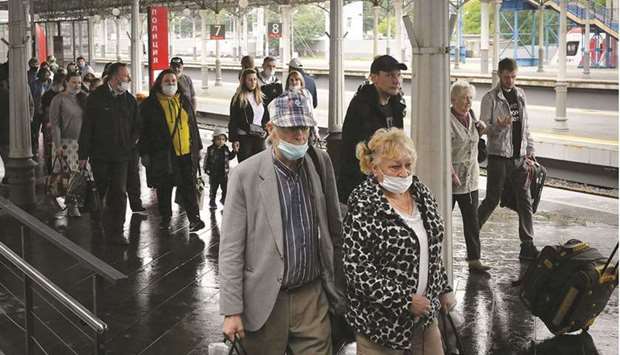European Union countries agreed yesterday to an easing of travel restrictions over summer that will allow fully vaccinated tourists to avoid tests or quarantines and broaden the list of EU regions from which it is safe to travel.
Ambassadors from the 27 EU member states approved a modified European Commission proposal that people who have been fully vaccinated for 14 days should be able to travel freely from one EU country to another, current EU president Portugal said.
Restrictions for other travellers should be based on the degree to which the country they are coming from has coronavirus (Covid-19) infections under control.
Just over a quarter of EU adults are now fully vaccinated.
The revised guidelines come as the EU introduces Covid-19 certificates that will indicate whether a person is vaccinated, has immunity because they were previously infected, or has had a recent negative test.
The system is set to be ready by July 1, although some countries will launch certificates earlier.
As the pace of vaccinations accelerates, the bloc will loosen the traffic light colour coding to represent the relative safety of various EU regions.
“Green” regions must now have fewer than 25 cases per 100,000 people in 14 days, with below 4% of positive tests.
That will rise to 50, or 75 if the positivity rate is less than 1%.
The limits for the next, “orange” level will also rise.
For travel from a green zone, there should be no restrictions, from orange – potential for a test; for red – a possible quarantine; and non-essential travel discouraged for “dark red”.
Children aged 12 or more could be tested, but would only quarantine if an adult accompanying also had to.
EU member states will also be able to hit an “emergency brake” to bar all travellers from a region showing a spike in more infectious variants of the disease.
The system is designed also to apply to non-EU members of the open-border Schengen zone – Iceland, Liechtenstein, Norway and Switzerland, but not to former EU member Britain.
A similar traffic light system operates for other countries, with eight on a green list, but not Britain, which is being kept off for now due to the widespread incidence there of the Delta variant of the coronavirus.
Visitors from other countries could also come as long as they can prove they are vaccinated.
Border policy as a whole, though, is a matter for individual EU countries, so they can still set their own rules.
Switzerland meanwhile plans to ease entry restrictions this month and further open up public life as Covid-19 cases continue to decline, the government said.
Only people arriving from countries with worrying levels of coronavirus mutations would be in focus, and they could enter without testing as of June 28 as long as they had been vaccinated or recovered from a coronavirus infection, it said.
It would make a decision on June 23, when it would also rule whether to go ahead with a fifth wave of re-opening measures, including abolishing the need to wear masks in public.
In Russia, the mayor of Moscow sounded the alarm yesterday over a spike in coronavirus cases, saying that Covid-19 was becoming more difficult to treat as city authorities posted the highest number of daily infections since January.
“We expected that the spring pandemic peak would fall on April-May just like last year,” Sergei Sobyanin said. “But now we’re seeing that it has shifted towards June-July.”
Sobyanin, a close ally of President Vladimir Putin, estimated that around half of Moscow residents had by now some level of immunity against the virus.
“At the same time we are seeing just how aggressive Covid is,” he said, stressing that it was becoming more difficult to treat it.
“Quite a lot of Muscovites are in intensive care on ventilators,” he said. “The danger is real.”
Yesterday health authorities reported 5,853 new cases of coronavirus in Moscow, a record since mid-January.
Russia is among the countries hardest hit by Covid-19.
Russian health officials have registered more than 5mn coronavirus cases and more than 125,000 deaths, but some experts say that officials have vastly under report fatalities.
The country has lifted nearly all virus-related restrictions and many Russians are refusing to wear masks on public transport and in other public places.
Russia registered Sputnik V, the world’s first coronavirus vaccine, in August 2020, but authorities have struggled to ramp up vaccination efforts.
Italy reported 69 coronavirus-related deaths yesterday compared with 88 the day before, the health ministry said, while the daily tally of new infections fell to 1,901 from 2,079.
Italy has registered 126,924 deaths linked to Covid-19 since its outbreak emerged in February last year, the second-highest toll in Europe after Britain and the eight-highest in the world.
The country has reported 4.24mn cases to date.
France reported 3,871 new confirmed coronavirus cases yesterday, the second day in a row that the new cases tally was below 5,000 and the first time since late August 2020 that the seven-day moving average of new cases fell below 5,000.
The health ministry also reported 69 new coronavirus deaths in hospitals, and just five virus deaths in retirement care homes over the past three days.

Passengers, mostly unmasked and with some wearing face masks improperly, are seen yesterday on a platform of Belorussky railway station in Moscow.
